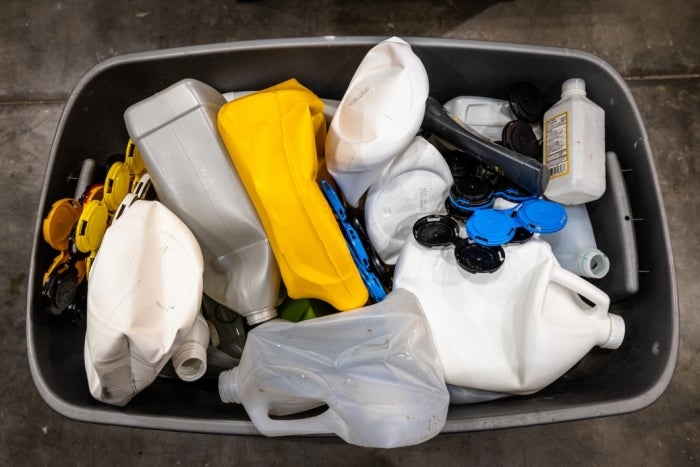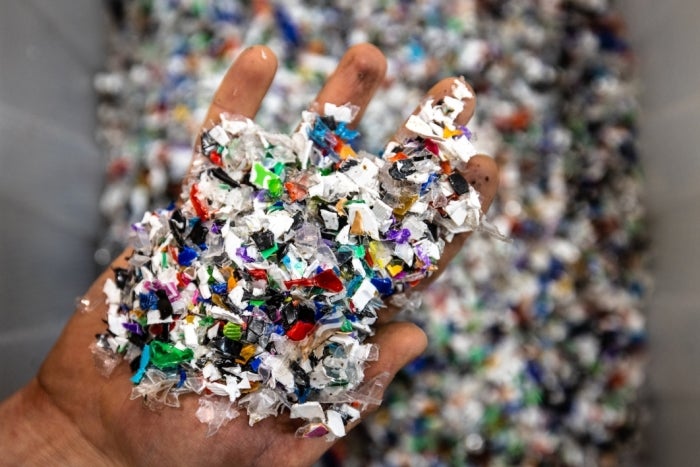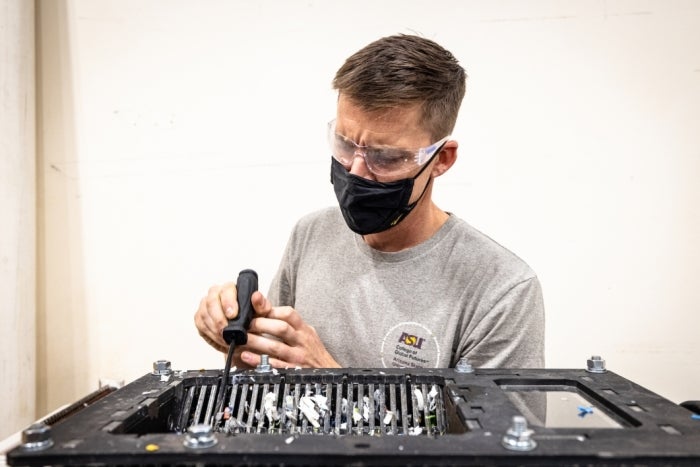Putting a dent in plastic waste

Fourth-year human systems engineering major Johna Yolo (left) and fourth-year chemistry major Nadya Soekardono place empty bottles in the plastic shredder Nov. 1 in the basement of the Design North building on the Tempe campus. Photo by Charlie Leight/ASU News
Tyler Eglen used to have more free time in his life.
But now he’s spending that time on a passion topic: plastics.
A project manager associate for Rob and Melani Walton Sustainability Solutions Service in the Julie Ann Wrigley Global Futures Laboratory, Eglen has big hopes and dreams to revitalize recycling through an innovative program on ASU’s Tempe campus.
“When I learned that our plastic recycling rate in the United States is lower than 9%, I knew that new solutions were needed,” Eglen said in advance of National Recycling Day, which is celebrated every Nov. 15 and aims to encourage people to purchase recycled products and recycle more. “That’s what gave me the fodder to go to ASU directly and start our initiative.”
Last year when Eglen was a graduate student, he was enrolled in an inaugural Graduate Immersion Program cohort within the Student Design Studio in the Office of Applied Innovation. His work ethic and intention to do something special regarding sustainability caught the eye of several people, including Michelle Govani.
“We supported Tyler’s work through a stipend, help connecting to and working with other units at ASU, and weekly mentorship and workshopping sessions,” said Govani, senior director of strategy and partnerships in the Office of Applied Innovation. “Tyler exemplified the way good work gets done at ASU — by boldly reaching across disciplinary and unit boundaries to bring people together around a shared, charter-aligned goal.”
One of Eglen’s goals was to start a student organization chapter of Precious Plastic at ASU. The award-winning Precious Plastic community hovers around 80,000 people and has approximately 1,000 chapters around the world since starting in 2014.
The ASU chapter was established in 2020 and is composed of about 40 students. They utilize social engagement, a suite of semi-industrial plastic-processing machines and education to empower people to clean up, recycle plastic and think about adopting zero-waste lifestyles.
“I was awarded $5,000 through a Sustainability Initiatives Revolving Fund grant from Zero Waste, and they encouraged me to create this student-run organization to support sustainability efforts, so that’s how it got started,” Eglen said. “We used the money to create a plastic-shredding machine in ASU’s Design School.”
Eglen said the club collects plastic items from the campus, shreds them into a “flake” and places them into an extruder to create new products. One of the products is plastic lumber, often used for park benches and porches, and at playgrounds.
“Plastic lumber is a great solution for wood since wood prices are going through the roof,” said Eglen, who spends about six to eight hours a week on club business. “It reduces waste, and it’s much more durable than wood.”
Right now the group’s operations are small and the work is time-intensive.
“Recycling is hard work,” said Johna Yolo, a fourth-year student majoring in human systems engineering who is the process lead for the club. “It’s hard, it’s labor-intensive and there’s very little payoff with the scale we’re at now. But I think we’re at the tip of the iceberg — there’s potential to do great things.”
Yolo’s reference to hard work is not to be underestimated. About 66 milk jugs have to be shredded and melted to make one 8-foot plastic lumber beam. Of course, that doesn’t take into account collecting the materials from bins, separating them, scraping off labels and twist caps, and cleaning them thoroughly before being recycled.
The group gathers materials through regular collections at the university and what Zero Waste sets aside: plastic utensils, straws, 3D printer filament, food containers, to-go cups, plastic signage, soda bottles, cosmetic containers, medicine bottles and even 5-gallon buckets from restaurants.
There are plans to go outside the university walls and start collections in the city of Mesa, zeroing in on apartment complexes, according to Michael Brady, a fourth-year civil engineering major.
“About 60% of all apartment complexes in Phoenix recycle,” said Brady, who is the club’s engineering lead. “There’s a chance that we can impact the community in ways that others can’t. The potential is big.”
Brady said Precious Plastic can help the community in more ways than one. He hopes one day they can create plastic bricks to make homeless shelters, durable water bottles, clamps and office furniture for ASU, and perhaps even create a retail component to make their club self-sustaining.
With all of the inroads the club is making, the public still needs to be educated on recycling and especially consumption, said Samantha Esparza, a second-year sustainability major who serves as the club’s lead for outreach and communications
“Plastic impacts the environment, and we have to find a way to educate people about their lifestyle and consumption habits,” she said. “Most people our age want to know about sustainability so the real challenge is to find out what they already know and what will interest them in practicing sustainability.”
Often, that means leading by example, Esparza said.
“One time we had an audit in front of the Student Services building, and we were literally digging in garbage bins finding plastic that was useful,” Esparza said. “I think we showed that we really care about our world.”
Precious Plastic @ ASU hosts a general meeting the first Thursday of every month, as well as working sessions throughout the week that include plastic shredding, and machine design and construction. All majors are welcome, especially those looking for capstone collaborations, and interested students can find the club through Sun Devil Sync.
For more information, visit Precious Plastic @ ASU.
More Environment and sustainability

Rethinking Water West conference explores sustainable solutions
How do you secure a future with clean, affordable water for fast-growing populations in places that are contending with unending drought, rising heat and a lot of outdated water supply infrastructure…
Meet the young students who designed an ocean-cleaning robot
A classroom in the middle of the Sonoran Desert might be the last place you’d expect to find ocean research — but that’s exactly what’s happening at Harvest Preparatory Academy in Yuma, Arizona.…

From ASU to the Amazon: Student bridges communities with solar canoe project
While Elizabeth Swanson Andi’s peers were lining up to collect their diplomas at the fall 2018 graduation ceremony at Arizona State University, she was on a plane headed to the Amazon rainforest in…





